1. Top/mow
The first step in controlling any rushes problem is to top or mow the affected area. As rushes are a perennial plant, old foliage will have a poor chemical uptake.
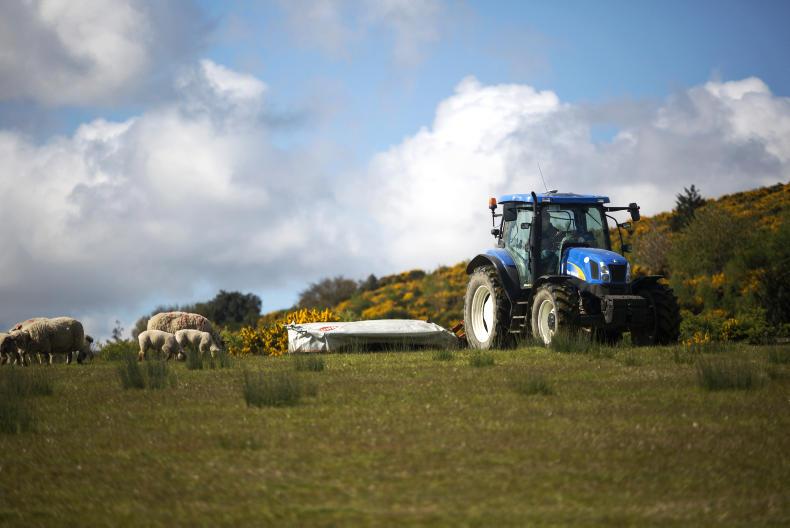
This is due to a thicker cuticle making it more difficult for herbicides to enter. By topping three weeks before spraying, the younger growing plant is far more likely to take up the herbicide.
2. MCPA
Correctly applied MCPA in June or July when growth conditions are good is one of the effective ways of controlling rushes although it is still effective later in the year.
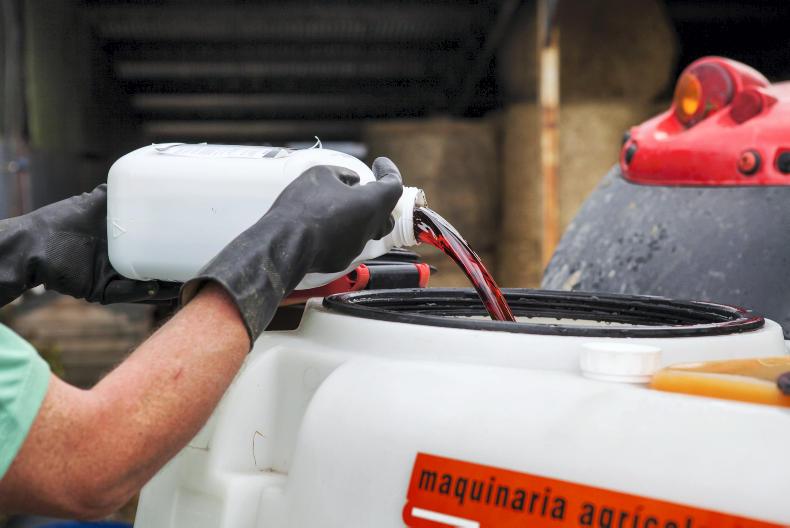
Always read the label and follow the instructions for correct application of the product.
It may be beneficial to include an adjuvant or sticking agent in the spray as this will help the herbicide to stick to the thin rush stalks.
3. Glyphosate
Round-up or equivalents can also be used to control rushes but only when used through a weed licker. If using glyphosate to control weeds, it is important that it is correctly applied.
As Round-up also kills grass, try to avoid using it in high pastures where grass could be inadvertently affected.
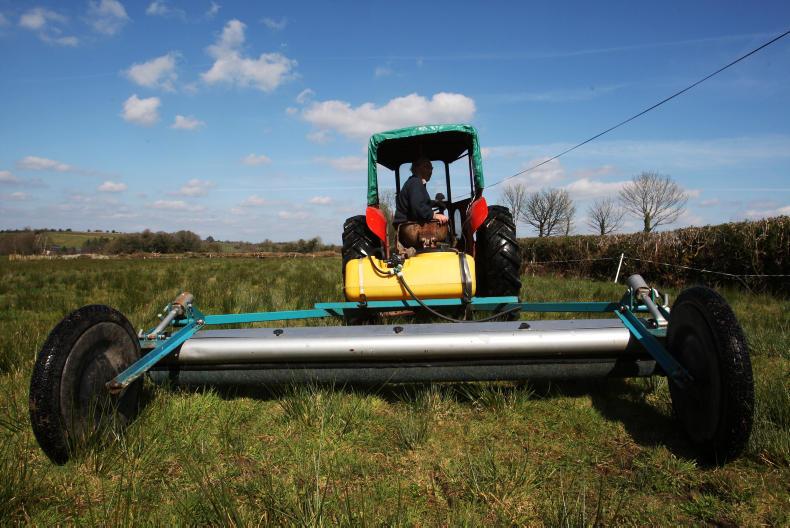
Livestock should be allowed to graze down swards before weed licking takes place to avoid this.
4. Watch the weather
 Spraying and weed licking should only take place in dry weather. By nature, rushes are more likely to be found on wet ground.
Spraying and weed licking should only take place in dry weather. By nature, rushes are more likely to be found on wet ground.
While this itself creates a challenge to prevent sprays entering watercourses, wet conditions will only exacerbate this problem.
No spraying should take place if rain is forecast in the next 48 hours as this significantly increases the risk of water contamination.
5. Have the correct training
As part of the Sustainable Use Directive introduced a number of years ago, anyone undertaking spraying herbicides must complete a training course.
Doing so will greatly enhance the operators knowledge of correct mixing volume and sprayer calibration, etc.
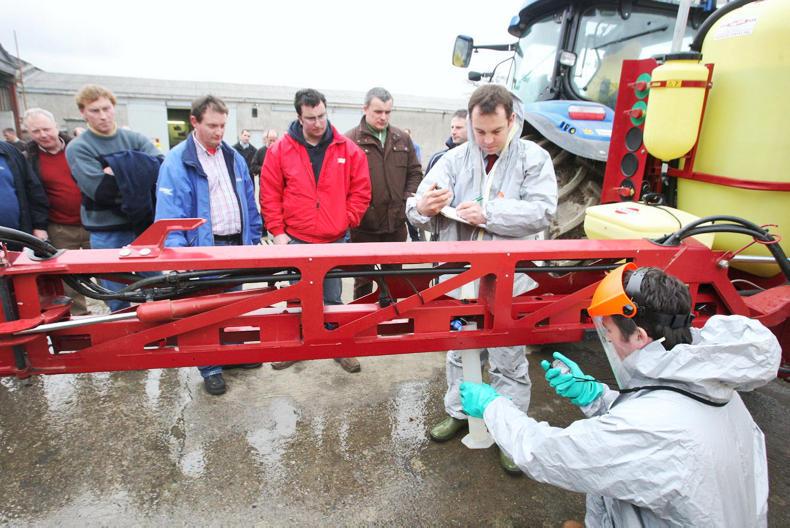
This will lead to a far more effective application of herbicide which, in turn, results in a better kill rate and savings as no product is wasted.
6. Avoid contamination
As alluded to earlier, preventing herbicides entering watercourses is crucial to protecting natural ecosystems.
Not only is biodiversity a huge positive in Irish countrysides, it is also vital to protect the continued use of both MCPA and glyphosate.
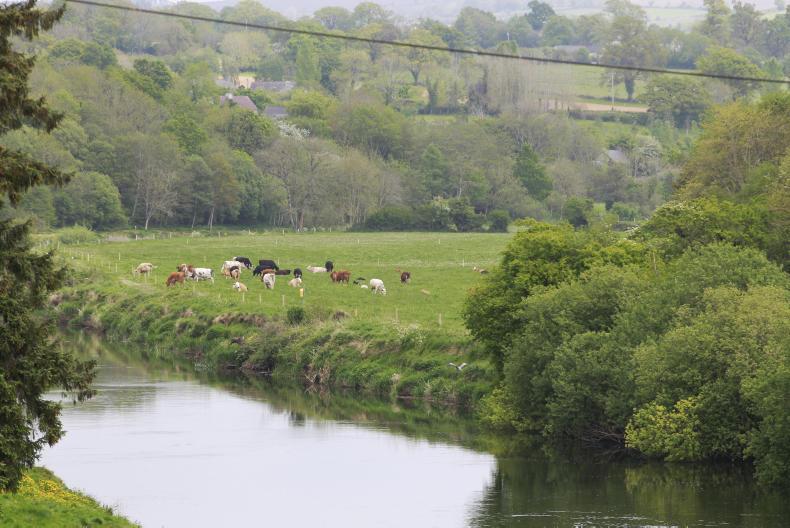
With no other available products on the market to tackle rushes a loss of one or both of these products could have devastating effects on Irish farms.
7. Prevent reintroduction
Once an infestation of rushes has been controlled it is important to prevent it from reoccurring.
Farming land more intensively and carefully can aid in that.
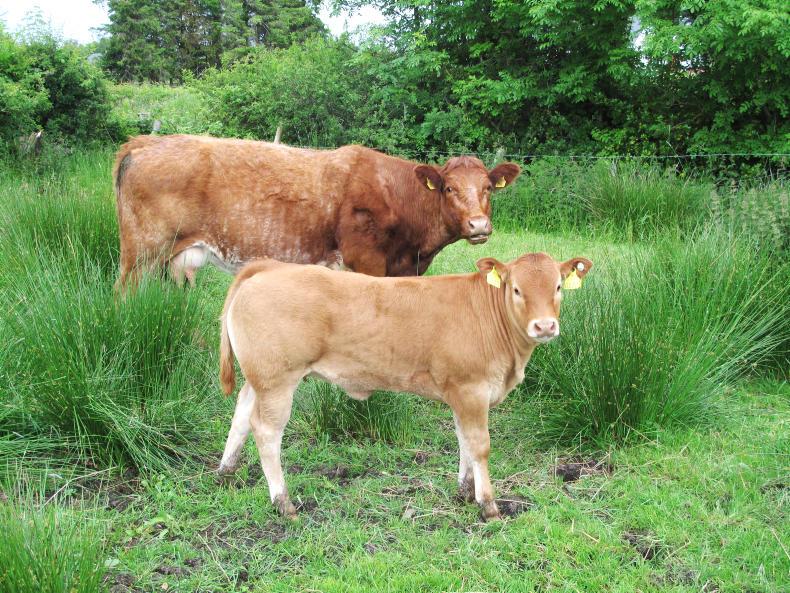
However, as stated previously, rushes are prevalent in generally wetter areas meaning stocking them intensively can lead to poaching. This, in turn, will allow rushes to creep back into pastures and undo work to control them.
8. Improve soil fertility
Growing more grass so it can actively compete with rushes is a one way of preventing reinfestation.
A soil test should be taken of the area to see where improvements can be made. Usually significant gains can be made by raising soil pH alone.
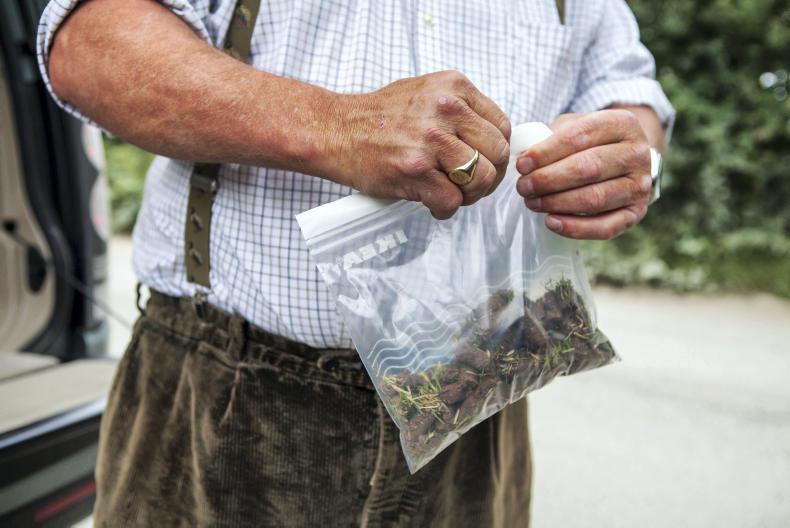
An acidic pH does not directly favour rushes but it will significantly inhibit grass growth so consider lime application as the first step to improve soil fertility.
9. Carry out drainage works
Perhaps one of the most effective preventative measures is long-term drainage work. Increasing the ability of the land to remove excess water will immediately make growth conditions more challenging for rushes.

It also means that pastures can be farmed in a more intensive way. Where areas have been successfully drained, it may also be worth considering reseeding.
10. Access yearly
Rome wasn’t built in a day and no field was ever cleared of rushes in a year.
Therefore, a long-term approach should be taken when addressing an infestation problem that may take two or three years to get fully under control.
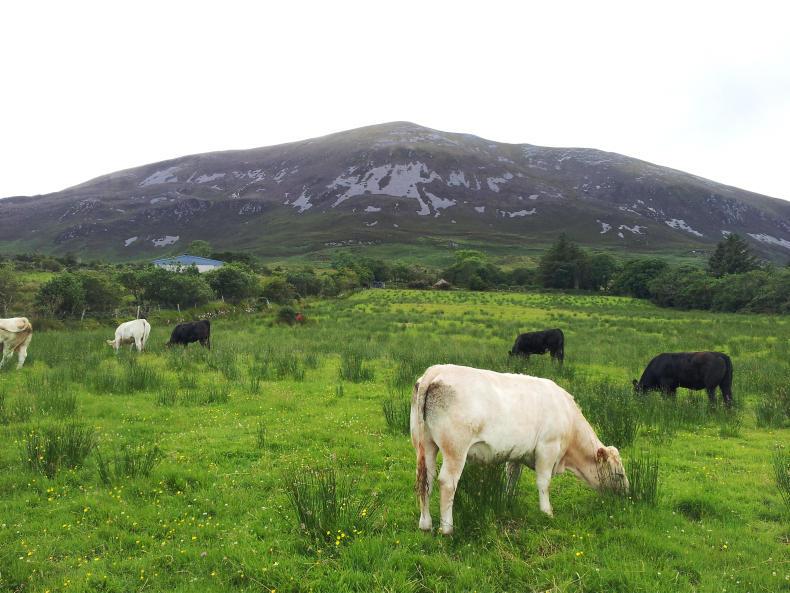
All affected areas should be reassessed each year to decide what control methods are needed. Doing so will help prevent any previous controls implemented going to waste.
Read more
Farmer writes: life after MCPA
More than rush spray in jeopardy
1. Top/mow
The first step in controlling any rushes problem is to top or mow the affected area. As rushes are a perennial plant, old foliage will have a poor chemical uptake.

This is due to a thicker cuticle making it more difficult for herbicides to enter. By topping three weeks before spraying, the younger growing plant is far more likely to take up the herbicide.
2. MCPA
Correctly applied MCPA in June or July when growth conditions are good is one of the effective ways of controlling rushes although it is still effective later in the year.

Always read the label and follow the instructions for correct application of the product.
It may be beneficial to include an adjuvant or sticking agent in the spray as this will help the herbicide to stick to the thin rush stalks.
3. Glyphosate
Round-up or equivalents can also be used to control rushes but only when used through a weed licker. If using glyphosate to control weeds, it is important that it is correctly applied.
As Round-up also kills grass, try to avoid using it in high pastures where grass could be inadvertently affected.

Livestock should be allowed to graze down swards before weed licking takes place to avoid this.
4. Watch the weather
 Spraying and weed licking should only take place in dry weather. By nature, rushes are more likely to be found on wet ground.
Spraying and weed licking should only take place in dry weather. By nature, rushes are more likely to be found on wet ground.
While this itself creates a challenge to prevent sprays entering watercourses, wet conditions will only exacerbate this problem.
No spraying should take place if rain is forecast in the next 48 hours as this significantly increases the risk of water contamination.
5. Have the correct training
As part of the Sustainable Use Directive introduced a number of years ago, anyone undertaking spraying herbicides must complete a training course.
Doing so will greatly enhance the operators knowledge of correct mixing volume and sprayer calibration, etc.

This will lead to a far more effective application of herbicide which, in turn, results in a better kill rate and savings as no product is wasted.
6. Avoid contamination
As alluded to earlier, preventing herbicides entering watercourses is crucial to protecting natural ecosystems.
Not only is biodiversity a huge positive in Irish countrysides, it is also vital to protect the continued use of both MCPA and glyphosate.

With no other available products on the market to tackle rushes a loss of one or both of these products could have devastating effects on Irish farms.
7. Prevent reintroduction
Once an infestation of rushes has been controlled it is important to prevent it from reoccurring.
Farming land more intensively and carefully can aid in that.

However, as stated previously, rushes are prevalent in generally wetter areas meaning stocking them intensively can lead to poaching. This, in turn, will allow rushes to creep back into pastures and undo work to control them.
8. Improve soil fertility
Growing more grass so it can actively compete with rushes is a one way of preventing reinfestation.
A soil test should be taken of the area to see where improvements can be made. Usually significant gains can be made by raising soil pH alone.

An acidic pH does not directly favour rushes but it will significantly inhibit grass growth so consider lime application as the first step to improve soil fertility.
9. Carry out drainage works
Perhaps one of the most effective preventative measures is long-term drainage work. Increasing the ability of the land to remove excess water will immediately make growth conditions more challenging for rushes.

It also means that pastures can be farmed in a more intensive way. Where areas have been successfully drained, it may also be worth considering reseeding.
10. Access yearly
Rome wasn’t built in a day and no field was ever cleared of rushes in a year.
Therefore, a long-term approach should be taken when addressing an infestation problem that may take two or three years to get fully under control.

All affected areas should be reassessed each year to decide what control methods are needed. Doing so will help prevent any previous controls implemented going to waste.
Read more
Farmer writes: life after MCPA
More than rush spray in jeopardy



 Spraying and weed licking should only take place in dry weather. By nature, rushes are more likely to be found on wet ground.
Spraying and weed licking should only take place in dry weather. By nature, rushes are more likely to be found on wet ground. 











 This is a subscriber-only article
This is a subscriber-only article










SHARING OPTIONS: